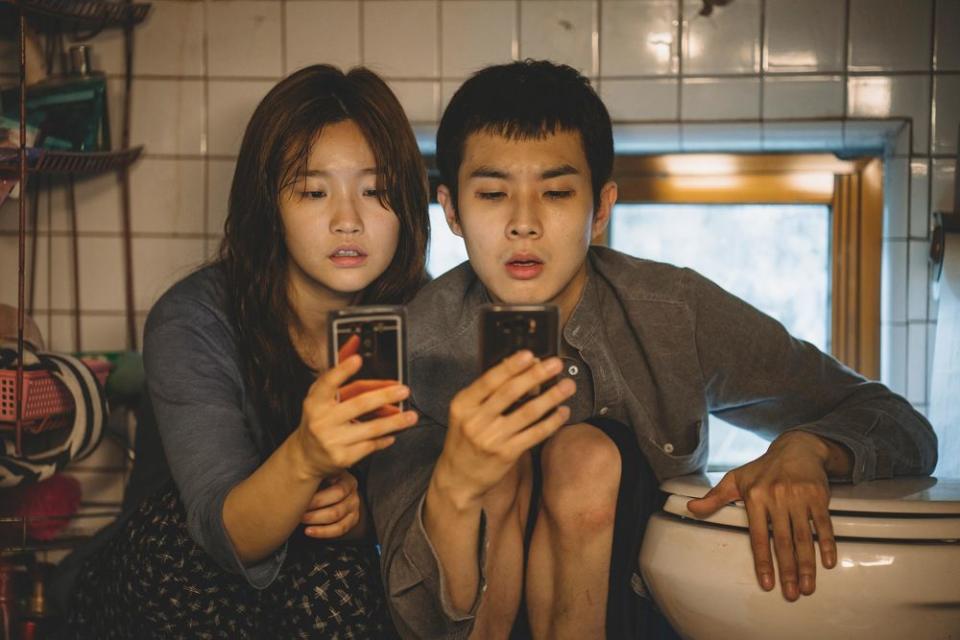Parasite director Bong Joon Ho discusses the film's twisty ending

Warning: This article contains major spoilers for Parasite. Read at your own risk.
Ever since it won the Palme d’Or at the Cannes Film Festival in May, Bong Joon Ho’s Parasite has been hailed as one of the year’s best films — but only now are most people getting the chance to see it. After opening to sold-out theaters in a limited release earlier this month, Parasite has now expanded to additional theaters and cities. So now it’s time to discuss spoilers!
The premise of Parasite follows the poor Kim family, whose young son Ki-woo (Choi Woo-shik) seizes on an opportunity to fill in as an English teacher for Da-hye (Jung Ji-so) of the rich Park family. Following his success, his other family members slowly insert themselves into the household, one by one.
Anyone who’s seen the movie knows it only gets crazier from there. As it turns out, the housekeeper (Lee Jung-eun) who gets replaced by Park Chung-sook (Jang Hye-jin) was hiding her husband, Geun-sae (Park Myung-hoon), in the home’s secret bunker basement. Though Parasite primarily depicts the stark inequality between rich and poor, these two poor families end up coming to blows over their respective claims to eating scraps from the Parks’ table.
“I think this is what really differentiates this film from other films that deal with rich and poor: You rarely see the poor fighting one another,” Bong tells EW. “It’s something that’s sad, but also something funny and foolish at the same time.”

Bong continues, “The protagonists, the Kim family, they live in a semi-basement home. It’s a unique residential structure that exists in Korea. The meaning of that structure is it’s half overground, half underground. They still have access to the overground, but they never know when they can fall even further below. In this story they finally encounter a couple that actually lives in a complete basement, without windows. It’s a sad story about these two families ending up antagonizing one another.”
Bong previously told EW that his films always delve into genre and black comedy because doing so helps process themes around class and inequality that aren’t openly discussed in everyday life. As tragic as the conflict between the Kims and the housekeeper is, the scene itself is ridiculously funny. When the housekeeper manages to catch the Kim’s admitting that they’re secretly family members on video, she uses it to hold them hostage, as if at gunpoint.
To add insult to injury, she then starts comically imitating a North Korean news anchor. Bong says this is mostly “just offbeat humor,” but it also conveys some important pathos about how she and her husband have been forced to live their lives.
“The housekeeper often would go down there in the secret bunker and spend time there and share intimate moments with the husband,” Bong says. “I think they would have often talked about how this famous architect built that bunker just in case North Korea invaded South. They’d just joke about how ‘Wow, thanks to North Korea we get to live in this house,’ and that would lead to these other jokes about North Korea. They would have fun making those jokes. I think that’s the context of that.”
The Kims win their initial fight, and even inadvertently kill the housekeeper. But Geun-sae survives, and he emerges in a murderous rage the next day during the Parks’ impromptu birthday party for their young son. He attacks during a game of cowboys and Indians, and even inspires Kim Ki-taek (Song Kang-ho) to murder the Park patriarch himself. The role of cowboys and Indians in this bout of class-war violence was no accident, says Bong.
“I wouldn’t go so far as to say it’s a commentary on what happened in the United States, but it’s related in the sense that this family starts infiltrating the house and they already find a family living there. So you could say it’s a joke in that context,” Bong says. “But at the same time, the Native Americans have a very complicated and long, deep history. But in this family, that story is reduced to a young boy’s hobby and decoration. [The boy’s mother] mentions the tent as a U.S. imported good, and I think it’s like the Che Guevara T-shirts that people wear. They don’t know the life of the revolutionary figure, they just think it’s a cool T-shirt. That’s what happens in our current time: The context and meaning behind these actual things only exists as a surface-level thing.”
As for Parasite itself, it’s anything but surface-level.
Related content:

